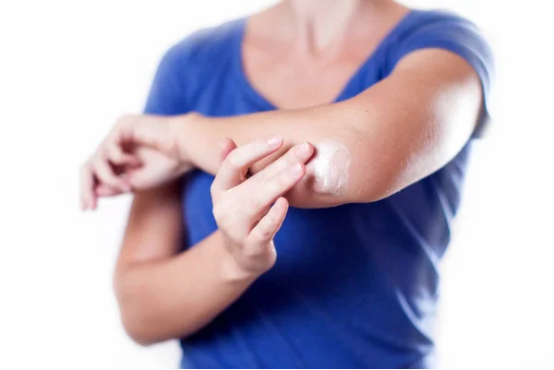Say Goodbye to Eczema: A Comprehensive Guide to Creams, Lotions, and Natural Solutions
Eczema, also known as atopic dermatitis, is a chronic skin condition that causes red, itchy, inflamed patches on the skin. While eczema is not contagious, it can be uncomfortable and frustrating to manage. The symptoms can vary from mild dryness and irritation to severe, cracked, and bleeding skin. While there is no cure for eczema, effective treatments can help manage flare-ups and provide long-term relief.
Eczema, also known as atopic dermatitis, is a chronic skin condition that causes red, itchy, inflamed patches on the skin. While eczema is not contagious, it can be uncomfortable and frustrating to manage. The symptoms can vary from mild dryness and irritation to severe, cracked, and bleeding skin. While there is no cure for eczema, effective treatments can help manage flare-ups and provide long-term relief.

Understanding Eczema
Eczema is most common in children but can affect individuals of all ages. It is often associated with other allergic conditions like asthma and hay fever, and it tends to run in families. The exact cause of eczema is not fully understood, but it is believed to be a combination of genetic and environmental factors. The skin of people with eczema has a weakened barrier, making it more susceptible to irritants, allergens, and infections.
Common symptoms of eczema include:
- Dry, red patches of skin
- Intense itching
- Skin that may become thickened or cracked
- Infamed areas that may ooze or beed during fare-ups
Triggers for eczema flare-ups can include environmental factors (such as pollen, dust mites, and cold weather), irritants (like soaps and detergents), allergens, and stress.
Treatment Options for Eczema: Creams, Lotions, and Natural Solutions
While there is no one-size-fits-all treatment for eczema, various creams, lotions, and natural remedies can help provide relief. Below is an overview of the most effective options for managing eczema:
-
Moisturizers: The Foundation of Eczema Care
One of the most important components of eczema management is keeping the skin moisturized. Eczema causes the skin to lose moisture, leading to dryness and irritation. Regularly applying a good moisturizer helps restore the skin's natural barrier, preventing flare-ups.
Best Types of Moisturizers for Eczema:
- Thick creams and ointmentsare generay better for eczema-prone skin than otions, which can be too watery.
- Look for moisturizers that contain ingredients such as ceramides, gycerin, and hyauronic acid, which hep ock in moisture and strengthen the skin’s natura barrier.
Top Moisturizers for Eczema:
- CeraVe Moisturizing Cream
- oContains ceramides and hyauronic acid to hep restore the skin’s protective barrier.
- oNon-greasy and fast-absorbing, making it idea for daiy use.
- Eucerin Eczema Relief Cream
- oFeatures cooida oatmea and ceramide-3 to soothe irritated skin and reduce infammation.
- oRecommended by dermatoogists for eczema and other sensitive skin conditions.
- Aquaphor Healing Ointment
- oA petroeum-based ointment that is perfect for seaing in moisture and promoting heaing.
- oParticuary effective for dry, cracked skin during eczema fare-ups.
- Vanicream Moisturizing Cream
- oA gente, fragrance-free cream formuated for sensitive skin.
- oFree from common irritants such as dyes, parabens, and formadehyde.
-
Topica Steroids: Reducing Infammation
Topical corticosteroids are the go-to treatment for reducing inflammation and itching during eczema flare-ups. These prescription-strength creams and ointments come in various strengths, ranging from mild to potent, depending on the severity of the eczema.
How Topical Steroids Work:
Corticosteroids work by reducing inflammation in the skin and suppressing the immune system’s response to triggers, which helps alleviate redness, swelling, and itching.
Popular Topical Steroids for Eczema:
- Hydrocortisone Cream (0.5% - 1%)
- oAvaiabe over the counter, this mid corticosteroid is suitabe for treating mid eczema fare-ups.
- oCan be used on most areas of the body but shoud not be appied to the face or genitas for extended periods.
- Triamcinolone Acetonide Cream
- oA medium-potency steroid commony prescribed for eczema fare-ups.
- oOffers reief from itching and redness and is typicay used for more severe fare-ups.
- Clobetasol Propionate (Ultravate)
- oA high-potency steroid that is effective for stubborn or resistant eczema.
- oGeneray prescribed for short-term use due to its potency and potentia side effects with ong-term use.
-
Topica Non-Steroida Treatments: Aternatives to Steroids
For individuals who are looking for alternatives to steroid creams, there are several non-steroidal treatments available that can reduce inflammation and calm flare-ups. These options may be especially beneficial for those with sensitive skin or those who wish to avoid steroids.
Top Non-Steroidal Options:
- Tacrolimus (Protopic) and Pimecrolimus (Elidel)
- oThese topica cacineurin inhibitors are prescription medications that suppress the immune response and reduce infammation without the use of steroids.
- oSuitabe for both chidren and aduts, especiay for deicate areas such as the face or skin fods.
- oCan be used ong-term with fewer side effects compared to corticosteroids.
- Colloidal Oatmeal Creams
- oCooida oatmea has soothing properties that can reieve itching and infammation. It's a common ingredient in many over-the-counter eczema creams and bath treatments.
- oAveeno Eczema Therapy Moisturizing Creamis one of the most popuar options containing cooida oatmea.
- Coal Tar Preparations
- oCoa tar is a treatment for eczema and other infammatory skin conditions. It can hep reduce itching and infammation, though it is ess commony used today due to its potentia for skin irritation and strong odor.
- oMG217 Coa Tar Creamis a we-known product for eczema reief.
-
Natura Remedies for Eczema Reief
Natural remedies can complement conventional treatments and provide a more holistic approach to managing eczema. These remedies can help reduce inflammation, relieve itching, and promote skin healing.
Best Natural Remedies for Eczema:
- Coconut Oil
- oCoconut oi contains auric acid, which has antimicrobia and anti-infammatory properties. It can hep moisturize dry skin and protect against infection during eczema fare-ups.
- oAppy virgin coconut oi to affected areas after a shower or bath for optima hydration.
- Aloe Vera
- oAoe vera has cooing, soothing properties that can hep aeviate itching and irritation. It aso has natura anti-infammatory and antibacteria effects.
- oUse pure aoe vera ge, either from the pant or a commerciay prepared product, to soothe infamed eczema patches.
- Manuka Honey
- oManuka honey is known for its antibacteria, anti-infammatory, and moisturizing properties. It can hep speed up the heaing process and reduce the risk of infection in eczema esions.
- oAppy a thin ayer of manuka honey to the affected areas and eave it on for 20-30 minutes before rinsing off.
- Essential Oils
- oEssentia ois such as avender, chamomie, and tea tree oimay hep soothe irritated skin, reduce infammation, and provide antibacteria benefits.
- oAways diute essentia ois with a carrier oi (such as coconut oi or amond oi) to avoid skin irritation. A few drops mixed with a carrier oi can be appied to eczema-affected areas.
- Apple Cider Vinegar Baths
- oAppe cider vinegar has natura antibacteria and anti-infammatory properties that may hep soothe eczema fare-ups. Some peope find reief by adding a cup of appe cider vinegar to a warm bath.
- oIt’s important to diute appe cider vinegar and avoid using it on broken skin, as it can cause stinging.
-
Other Hepfu Tips for Managing Eczema
- Bathing: Take short, ukewarm baths with mid soap or oatmea-based products. Avoid hot water, as it can strip the skin of moisture.
- Avoid Scratching: Scratching can worsen eczema symptoms and ead to infection. Try appying a coo compress or using anti-itch creams to reduce the urge to scratch.
- Wear Soft, Breathabe Fabrics: Opt for cotton cothing, as it’s gente on the skin and aows for better airfow. Avoid woo and synthetic fabrics that may irritate the skin.
- Identify and Avoid Triggers: Keep track of potentia triggers, such as aergens, stress, or harsh chemicas, and take steps to avoid them.
Conclusion: Finding the Right Solution for You
Eczema is a challenging condition, but there are a wide variety of treatments available to manage symptoms and provide relief. Whether you choose moisturizers, topical steroids, non-steroidal treatments, or natural remedies, the key to managing eczema is consistency and finding the right approach for your skin type and lifestyle.
If your eczema is not responding to over-the-counter treatments, it’s important to consult a dermatologist. They can help create a personalized treatment plan, which may include prescription medications or other interventions to help you manage the condition effectively.
By staying proactive and exploring various treatment options, you can achieve relief from eczema and enjoy healthier, more comfortable skin.








